2015 新疆考研英语一真题及答案
Section I Use of English
Directions:
Read the following text. Choose the best word(s) for each numbered blank and mark
A, B, C or D on ANSWER SHEET 1. (10 points)
Though not biologically related, friends are as "related" as fourth cousins, sharing
about 1% of genes. That is
1
a study,published from the University of
California and Yale University in the Proceedings of the National Academy of Sciences,
has
2
.
The study is a genome-wide analysis conducted
3
1932 unique subjects
which
4
pairs of unrelated friends and unrelated strangers. The same people
were used in both
5
.
While 1% may seem
6
, it is not so to a geneticist. As co-author of the study
James Fowler, professor of medical genetics at UC San Diego, says, "Most people do
not even
7
their fourth cousins but somehow manage to select as friends the
people who
8
our kin."
The study
9
found that the genes for smell were something shared in friends
but not genes for immunity. Why this similarity exists in smell genes is difficult
to explain, for now.
10
, as the team suggests, it draws us to similar
environments but there is more
11
it. There could be many mechanisms working
�
together that
12
us in choosing genetically similar friends
13
"functional
kinship" of being friends with
14
!
One of the remarkable findings of the study was that the similar genes seem to be
evolving
15
than other genes. Studying this could help 16 why human evolution
picked pace in the last 30,000 years, with social environment being a
major
17
factor.
The findings do not simply explain people's
18
to befriend those of
similar
19
backgrounds, say the researchers. Though all the subjects were
drawn from a population of European extraction, care was taken to
20
that all
subjects, friends and strangers were taken from the same population.
1. [A] when [B] why [C] how [D] what
【答案】[D] what
【解析】该题考查的是语法知识。根据句子结构和选项的特点,可以判断出空格处应填从属
连词引导从句;再根据句子的内容,可以看出该从句是一项研究的相关内容(what),不是指
研究的时间(when), 原因(why)和方式(how),因此,该题的答案为 what。
2. [A] defended [B] concluded [C] withdrawn [D] advised
【答案】[B] concluded
【解析】从此题所在的句子的前后内容可以判断出,that is_______ 中的 that 是指第一句
话的内容(朋友与我们基因上的相关性),很显然是研究得出的结论。因此,答案为
concluded。
�
3. [A] for [B] with [C] on [D] by
【答案】[C] on
【解析】根据空格所在句子的内容(研究对 1932 分独特的受试者进行分析)判断出进行分析
的对象是 1932 unique subjects。conduct analysis on…是固定表达。
4. [A] compared [B] sought [C] separated [D] connected
【答案】[A] compared
【解析】该空格所在的句子是 which 引导的定语从句修饰 study,意思是:对几对基因不相
关的朋友和陌生人进行_______。因为“研究”的内容是关于朋友间基因上的相关性问题,
所以完整的意思应该是:对几对基因不相关的朋友和陌生人进行比较。所以最佳答案为
compared。
5. [A] tests [B] objects [C]samples [D] examples
【答案】[C] samples
【解析】根据空格的前后内容判断,到第五个空为止,文章都在讲实验过程,和实验对象,
第五个空格所在句子的内容是:相同的人们都用于实验中的这两类______。所以根据上下文
语境和内容,应该选与实验对象相对应的 samples(样例).因此,答案是 samples。
6. [A] insignificant [B] unexpected [C]unbelievable [D] incredible
【答案】[A] insignificant
�
【解析】空的语境为:尽管这 1%看起来似乎____,但是遗传学家可不这么认为。空前后形
成对比转折的逻辑关系,而从后文列举的例子中可知遗传学家 James Fowler 对这 1%基因的
态度是肯定的,故答案为 A。
7. [A] visit [B] miss [C] seek [D] know
【答案】[D] know
【解析】空的语境为:大多数人甚至不____他们隔三代的表亲,但却设法选择那些____我们
亲戚的人作为朋友。填入的词必须满足前后句之间的转折逻辑关系,四个选项带入,只有 D
选项符合上下文语义。
8. [A] resemble [B] influence [C] favor [D] surpass
【答案】[A] resemble
【解析】空的语境为:大多数人甚至不认识他们隔三代的表亲,但却设法选择那些____我们
亲戚的人作为朋友。根据全文中心:基因上的相似性,可知本题选择 A。
9. [A] again [B] also [C] instead [D] thus
【答案】[B] also
【解析】空所在的句子开头用“The study…”,显然这是对上文话题的继续阐述,前文指出
研究发现朋友与我们有 1%的基因关系,而空所在句“the genes for smell were something
shared in friends”在进一步详细讨论该话题,前后之间是顺接关系,故答案为 B。
10. [A] Meanwhile [B] Furthermore [C] Likewise [D] Perhaps
�
【答案】[D] Perhaps
【解析】从选项和文字中句子结构可以判断,空格处要求填入一个能够体现前后两个句子逻
辑关系的副词,空前的句子谈到“为什么在嗅觉基因方面存在相似性还很难解释”,空后却
紧接着对此得出一个相关结论,很明显是矛盾的,所以此结论只能是一种不确定的推测,故
答案为 D。
11. [A] about [B] to [C]from [D]like
【答案】[B] to
【解析】该题为介词选择题。后半句出现比较级,可见是和前文形成比较关系,因此和上半
句介词保持一致,用介词 to。该句翻译:它(这种相似性)吸引我们到相同的环境,并且使
我们更为相似。因此答案为 to。
12. [A] drive [B] observe [C] confuse [D]limit
【答案】[A] drive
【解析】该句意思为:很多机制共同作用,从而_____我们选择基因相似的朋友,_____和_____
交朋友的“功能关系”。根据上下文可知,此处所填入动词需符合结构_____sb. in doing sth,
B 选项 observe(观察,遵守)和 C 选项 confuse(困惑)均无此用法。符合该结构只有 A 选项
drive(驱使)和 D 选项 limit(限制)。根据上下文可得知:这些机制驱使我们选择基因相似
的朋友,符合文章主题。如果选限制则为反向干扰。因此答案为 drive。
13. [A] according to [B] rather than [C] regardless of [D] along with
【答案】[B] rather than
�
【解析】所填词为逻辑关系短语,空前说选择基因相似的朋友,空后说具有“实用关系”的
朋友,可知前后为对立关系,并且根据文章主题,可知肯定前者而否定后者,可锁定 B 选项
rather than。A 选项 according to(根据)没有体现出对立及取舍关系,因此排除;C 选项
regardless of(不管)表让步关系,干扰性较强,但文章更强调取前舍后,因此排除;D 选项
along with(伴随)表顺接,故排除。故答案为 rather than。
14. [A] chances [B]responses [C]missions [D]benefits
【答案】[D] benefits
【解析】根据前文 functional kinship(实用关系)可得出 D 选项 benefits(利益),前后形
成呼应。A 选项 chances(机会)、B 选项 responses(反应)、C 选项 missions(使命)均不符合
题意。故答案为 benefits。
15. [A] later [B]slower [C] faster [D] earlier
【答案】[C] faster
【解析】该句为:evolving ______ than other genes(比其他基因进化得______). 根据同
词复现,我们找到该段第二句话中:human evolution picked pace in the last 30,000
years(人类进化在过去 30000 年间提速)。C 选项 faster 与下文 picked pace(加速)形成呼
应,故答案为 faster。
16. [A]forecast [B]remember [C]understand [D]express
【答案】[C] understand
�
【解析】此题考查动词。根据语意。空格后面是一个 why 引导的宾语从句,意为“人类进化
在过去三万年间得以加速的原因”,表示这一研究的结果和意义。能与这一宾语从句构成搭
配的只有 C 选项 understand。A 选项 forecast“预测”与“过去三万年”相矛盾,B 选项
remember“记住”和 D 选项“express”均不符合文意。
17. [A] unpredictable [B]contributory [C] controllable [D] disruptive
【答案】[B] contributory
【解析】此空需要填入一个形容词,表达社会环境对人类进步所起到的作用。help,pick pace
这两个词表达的都是积极的含义,因此此处需要填入一个带有褒义的感情色彩的词, 因此
排除 A 选项“不可预测的”和 D 选项“破坏性的”; B 而 C 选项“可控的”,与语意无关;
因此正确答案为 B 选项 contributory“促进的”。
18. [A] endeavor [B]decision [C]arrangement [D] tendency
【答案】[D] tendency
【解析】此处进一步陈述这一研究的结论。A 选项 endeavor“努力”,B 选项“决定”,C
选项“安排”,D 选项“倾向”。本文的主旨重在解释人们在交朋友的不自觉的一种倾向,
而非通过人为的有意识的举动来选择朋友。因此正确答案为 D。
19. [A] political [B] religious [C] ethnic [D] economic
【答案】[C] ethnic
【解析】结合文意,人们普遍希望和有相似基因背景的人。C 选项 ethnic 意为“种族的,
民族的”,是对上文中多次重复出现的 genes,以及下文的 the same population 的同义复
�
现。因此正确答案为 C。 A 选项 political“政治的”, B 选项“宗教的”,D 选项“经济
的”均不符合原文文意。
20. [A] see [B] show [C] prove [D] tell
【答案】[A] see
【解析】此处考察动词,动词势必要看前后搭配。see that 构成固定词组,意为“务必
使……”,符合文意,即:即使所有的受访者都拥有欧洲血统,(研究者们)仍然悉心确保所
有的受访者、朋友和陌生人都来自于同一群种。选项 B“展示”,选项 C“证明”,选项 D“辨
别”均无此含义,且不符合文意。
Section II Reading Comprehension
Part A
Directions:
Read the following four texts. Answer the questions below each text by choosing
A, B, C or D. Mark your answers on ANSWER SHEET. (40 points)
Text 1
King Juan Carlos of Spain once insisted “kings don’t abdicate, they dare in their
sleep.” But embarrassing scandals and the popularity of the republican left in the
recent Euro-elections have forced him to eat his words and stand down. So, does the
Spanish crisis suggest that monarchy is seeing its last days? Does that mean the
�
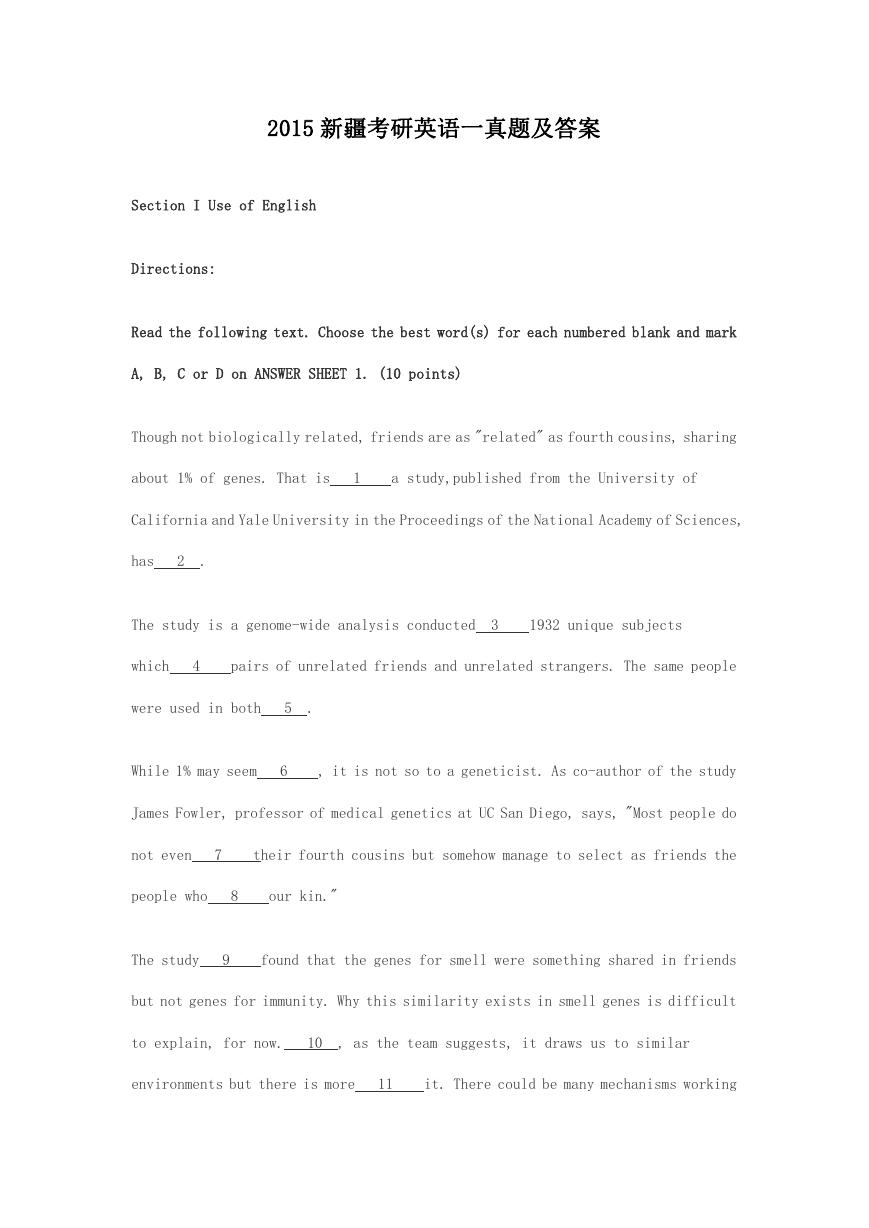
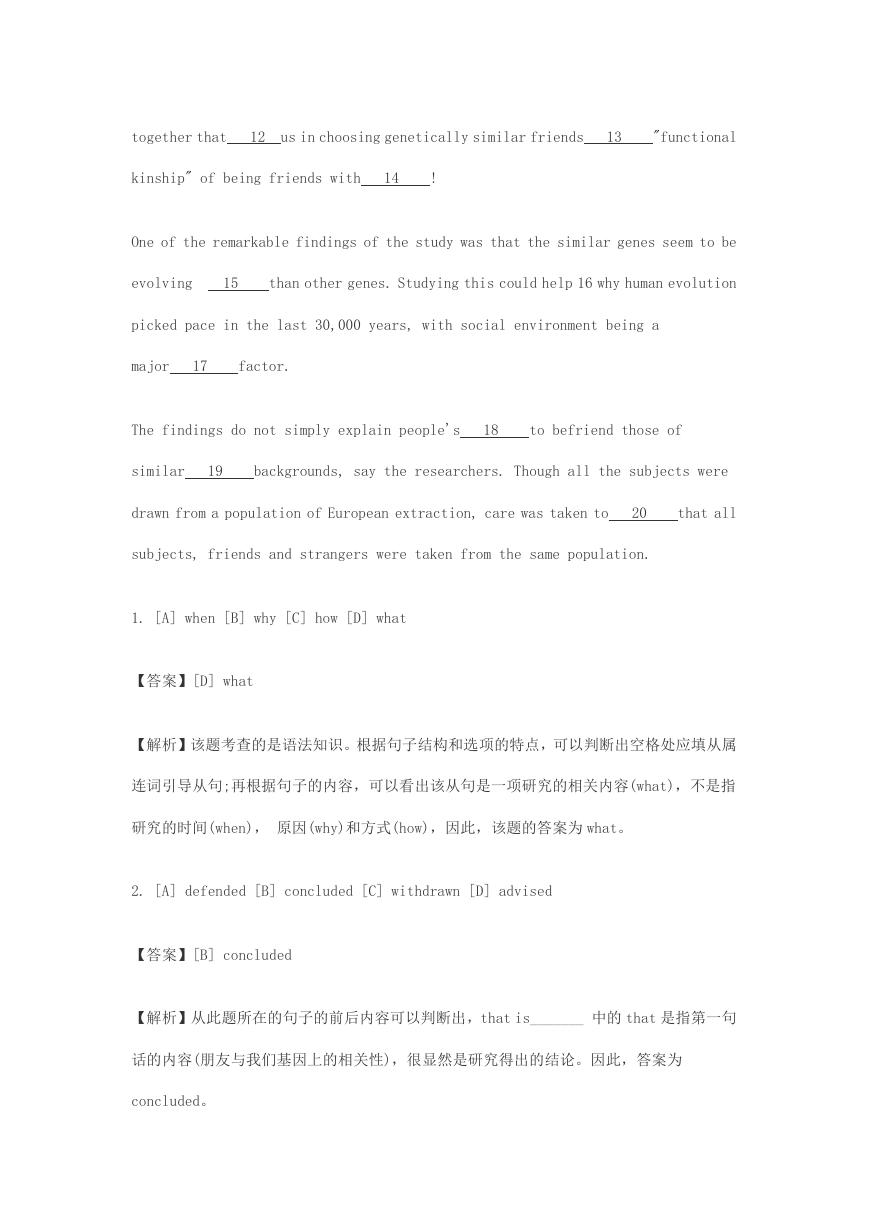

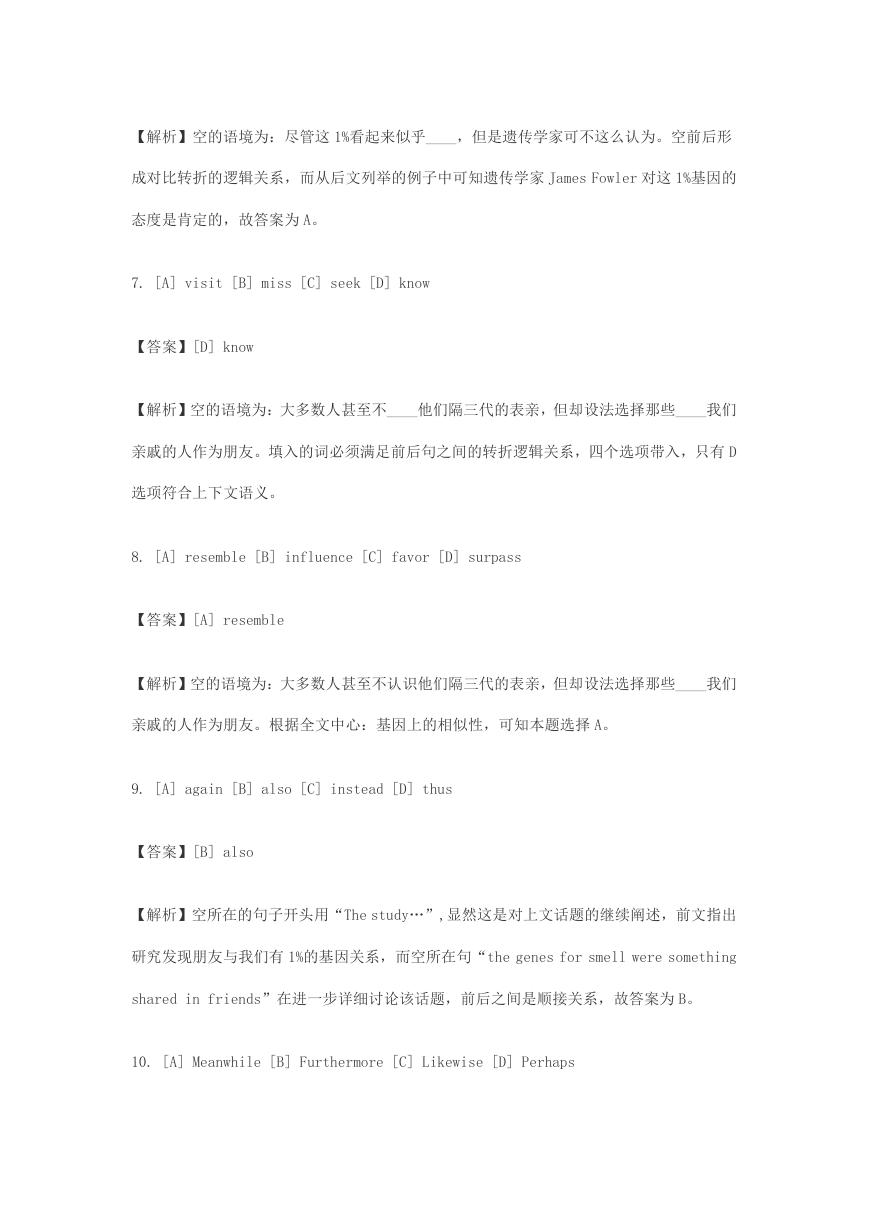
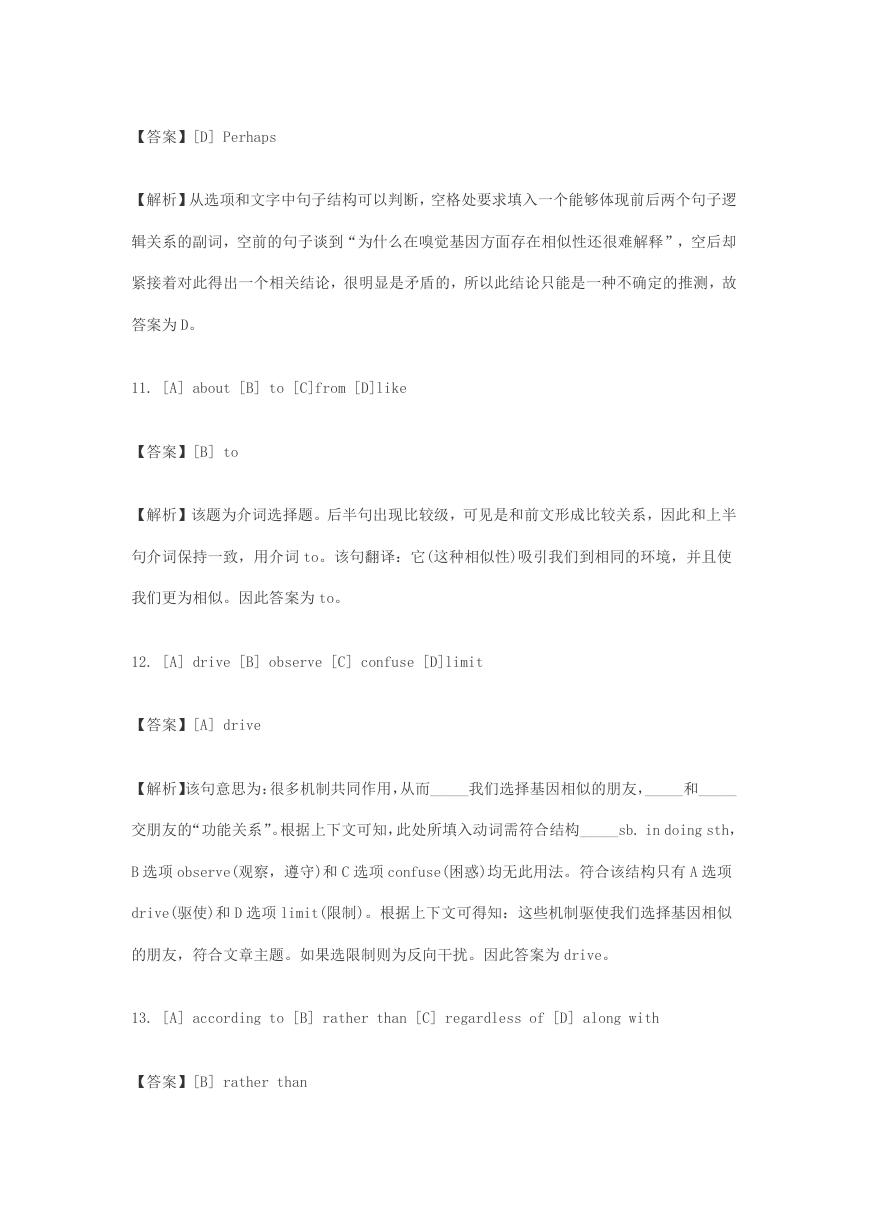
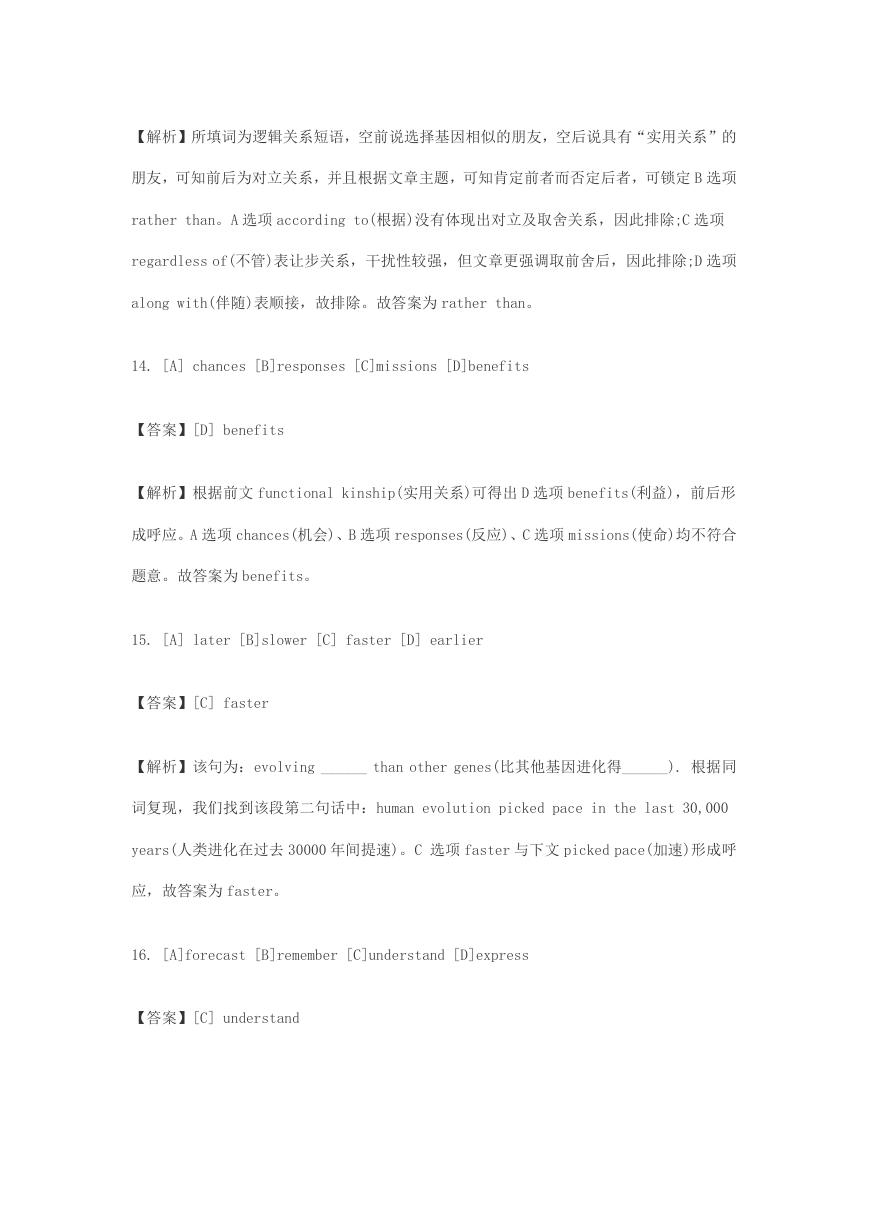
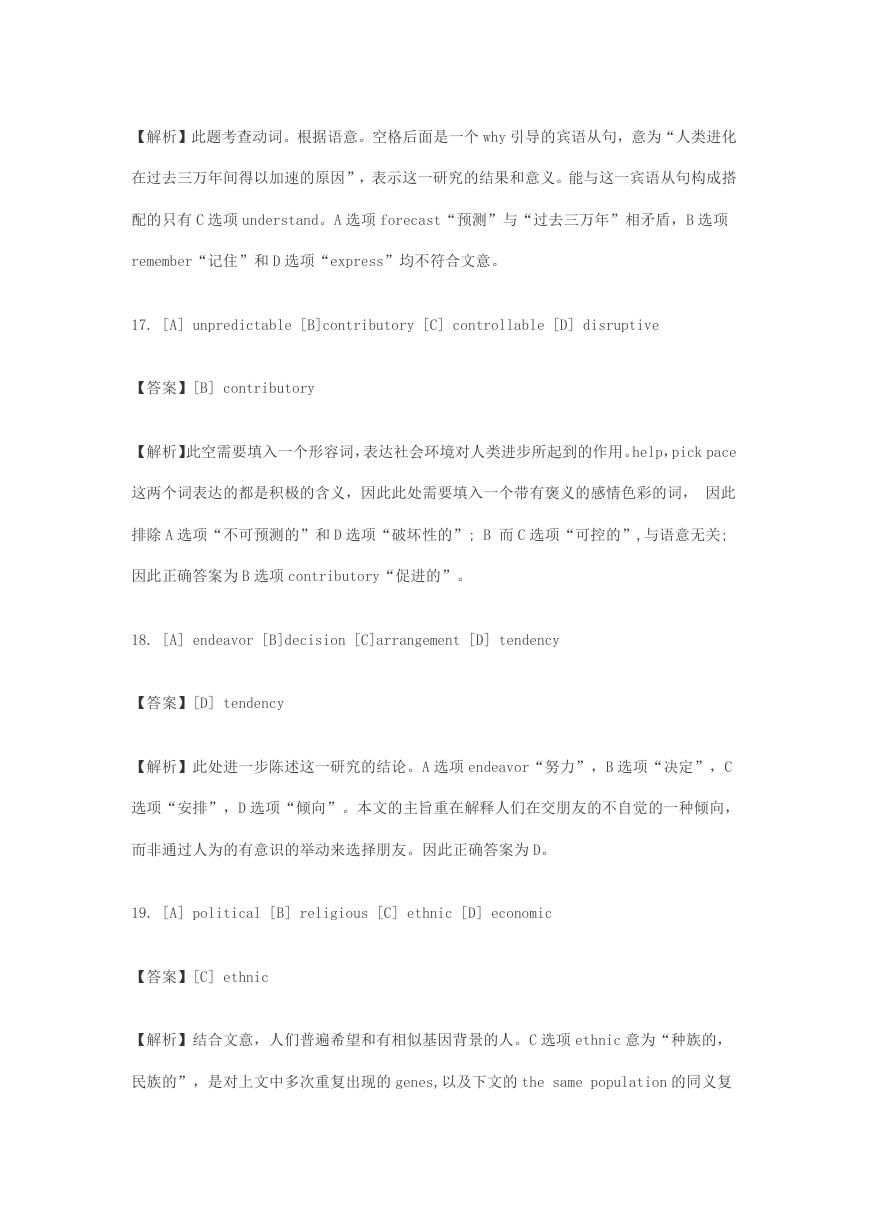
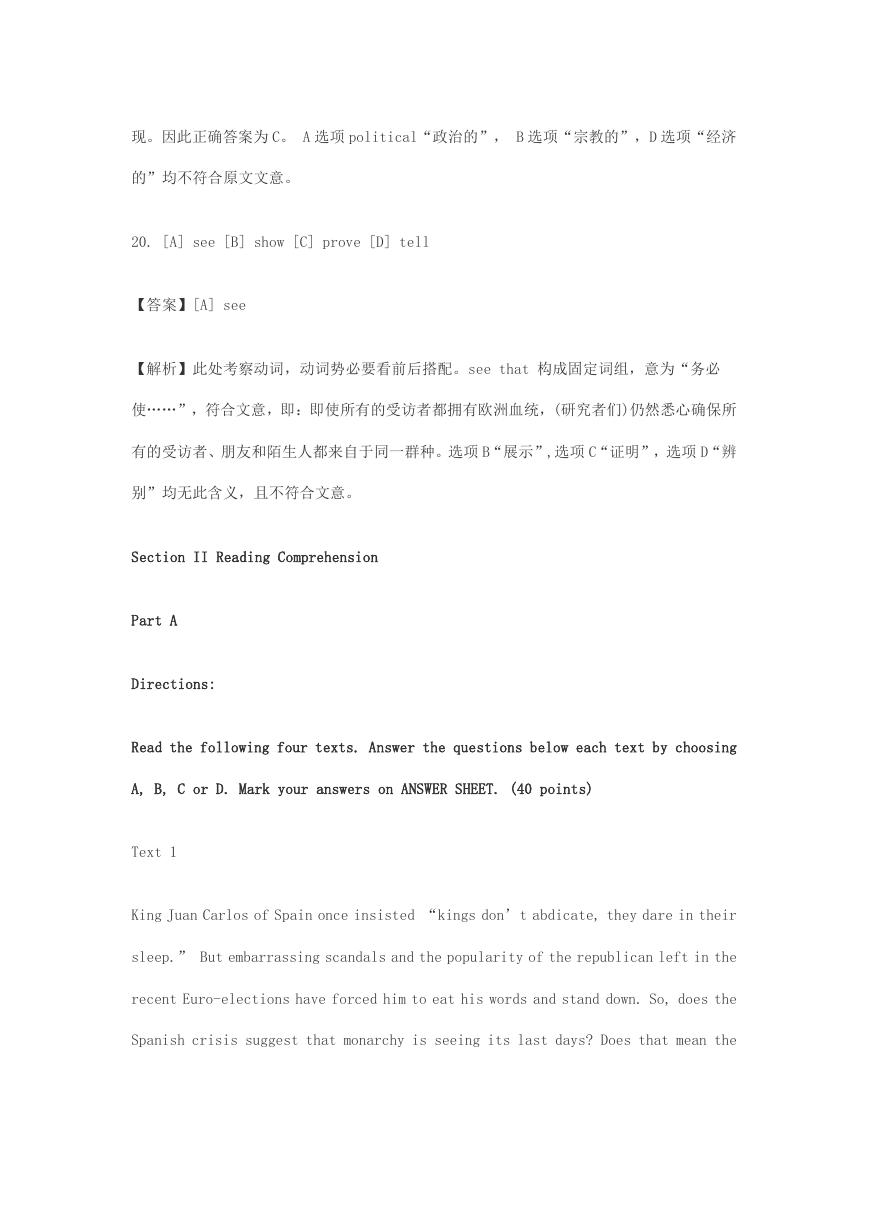








 2023年江西萍乡中考道德与法治真题及答案.doc
2023年江西萍乡中考道德与法治真题及答案.doc 2012年重庆南川中考生物真题及答案.doc
2012年重庆南川中考生物真题及答案.doc 2013年江西师范大学地理学综合及文艺理论基础考研真题.doc
2013年江西师范大学地理学综合及文艺理论基础考研真题.doc 2020年四川甘孜小升初语文真题及答案I卷.doc
2020年四川甘孜小升初语文真题及答案I卷.doc 2020年注册岩土工程师专业基础考试真题及答案.doc
2020年注册岩土工程师专业基础考试真题及答案.doc 2023-2024学年福建省厦门市九年级上学期数学月考试题及答案.doc
2023-2024学年福建省厦门市九年级上学期数学月考试题及答案.doc 2021-2022学年辽宁省沈阳市大东区九年级上学期语文期末试题及答案.doc
2021-2022学年辽宁省沈阳市大东区九年级上学期语文期末试题及答案.doc 2022-2023学年北京东城区初三第一学期物理期末试卷及答案.doc
2022-2023学年北京东城区初三第一学期物理期末试卷及答案.doc 2018上半年江西教师资格初中地理学科知识与教学能力真题及答案.doc
2018上半年江西教师资格初中地理学科知识与教学能力真题及答案.doc 2012年河北国家公务员申论考试真题及答案-省级.doc
2012年河北国家公务员申论考试真题及答案-省级.doc 2020-2021学年江苏省扬州市江都区邵樊片九年级上学期数学第一次质量检测试题及答案.doc
2020-2021学年江苏省扬州市江都区邵樊片九年级上学期数学第一次质量检测试题及答案.doc 2022下半年黑龙江教师资格证中学综合素质真题及答案.doc
2022下半年黑龙江教师资格证中学综合素质真题及答案.doc